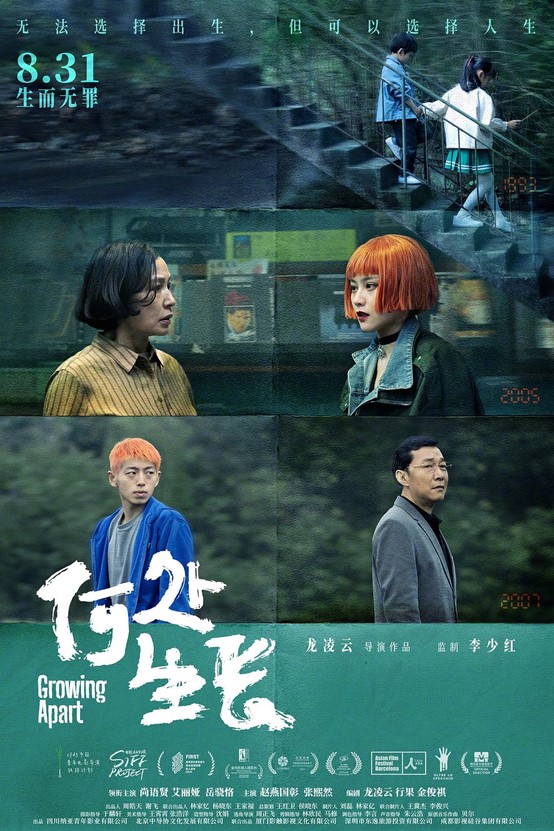
The film "Where We Grow," released on August 31, focuses on stories from original families.
18-year-old rebellious youth Cheng Fei (played by Yue Xiao Ke) unexpectedly discovers a missing person notice about an online friend, "Swallowtail Butterfly" - He Sheng (played by Shang Yu Xian), gradually uncovering that his connection with her goes far beyond the internet. Through a multi-timeline "pseudo-suspense perspective," the film reveals the profound impact of one’s original family on personal growth and choices as the characters seek family secrets.

Poster for "Where We Grow"
Director Long Lingyun, a member of the post-80s generation, studied fine arts from a young age and later pursued drama studies in the UK, working in fashion magazines and advertising for many years. Since starting to tell this story in 2014, he has spent ten years presenting a painful history of family and time, along with the helpless yet brave choices individuals make within it, to the audience. Before the film's release, Long Lingyun spoke exclusively with The Paper, sharing insights about his film and his observations of the world—a process of "growth."
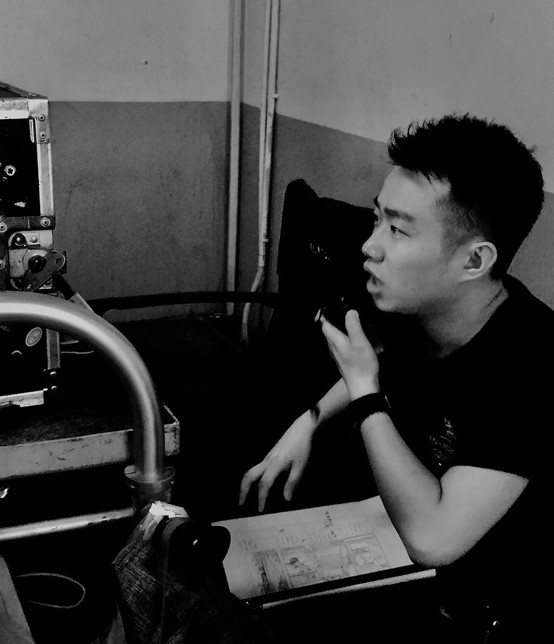
Director Long Lingyun of "Where We Grow"
A Small Family Stirring the Ripples of History
In 2015, China officially lifted its one-child policy, marking the end of a generation that had been the sole source of expectations and pressures for their parents. This transformation caused a significant impact on Long Lingyun, who was studying film at the Beijing Film Academy at the time. For someone born and raised under the one-child policy, having only one child in a family felt entirely "normal." Suddenly, this norm was disappearing, and he thought it was essential to discuss the feelings and history of this generation accumulated over more than 30 years.
The inspiration for "Where We Grow" came from the experiences of a female friend who once struggled with depression. While chatting with her, Long learned that the shackles she couldn’t escape from stemmed from her family. During her childhood, her father divorced her mother to have another chance at having a son. When he did have another child, it turned out to be another daughter, and his obsession with having a son inflicted indelible harm on both the original and the new family. The wounded mother converted her disappointment towards her husband into intense love and control over her daughter; the pressure she exerted left her friend gasping for breath, caught between empathy for her mother and the desire to rebel.
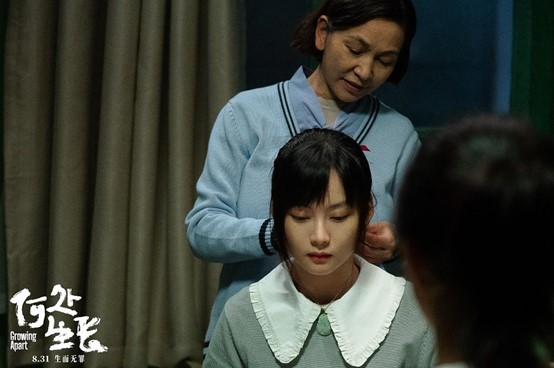
Still from "Where We Grow"
The experiences of his friend deeply shocked Long Lingyun and made him realize for the first time that this phenomenon was not exclusive to rural or impoverished areas, as he initially thought. Growing up in Chengdu, he had always been more accustomed to seeing strong women in the southwest, and the tales of Sichuan men being submissive to their wives dulled his sensitivity to the plight of women. However, his friend's experience helped him understand that the issue of "son preference" was hauntingly close to him. Subsequently, Long began to study these issues systematically, reading many feminist and sociological texts, concluding that "this story needed to be told."
After obtaining his friend's consent, he decided to bring this story to the screen. However, from his own male perspective and imagination, in the story, the father eventually gets the son he wanted. "I imagined, what if this younger brother suddenly learns one day that he has an unseen sister and that his birth was solely because his father wanted a boy? How would he view this?"

Siblings in the film who, in reality, lack the courage to meet turn into brother and sister who "spy" on each other.
In the film, gender issues emerge as a hidden suspense, gradually unveiling through the characters' ambiguous backgrounds. Long Lingyun combines the gender identity crisis of this generation with family conflicts, attempting to present a complex, authentic social landscape. The narrative follows a young boy as he traces the mysterious girl "Swallowtail Butterfly," revealing the lives of the previous generation step by step. The non-linear storytelling reconstructs and examines the character's growth alongside their historical context like a jigsaw puzzle.
This perspective allows the film's young protagonist to achieve a degree of "observation" towards the parental generation. The character played by Aaliyah, mother He Xiuqing, embodies an oppressive sense of suffocation, masked with the suffering and helplessness of another era. Growing up in a divorced family, Long Lingyun, as he aged, began attempting to comprehend his parents' choices and actions within a broader historical context.
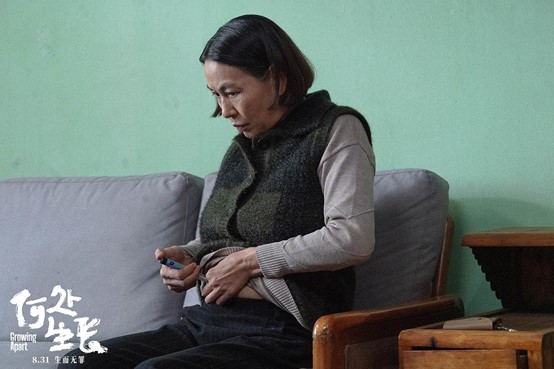
Still from "Where We Grow"
In "Where We Grow," mother He Xiuqing, a former educated youth, is forced to leave her hometown during her teenage years, enduring hard labor before being hurriedly thrust into marriage and family life. Her personal dreams and emotional needs are repressed, leading her to shift all her expectations and pressures onto the next generation. "Many people face not only personal issues but also the consequences of entire social structures and historical backgrounds; their life trajectories are often passively influenced by society and policies. This historical inertia results in a lack of autonomy in their lives."
In the film, He Xiuqing sings a well-known song from the educated youth era called "Song of the Educated Youth." Long Lingyun reveals the story behind it to reporters; it was a song created by educated youth sent to Yunnan from Nanjing. The song expresses the deep nostalgia of educated youth for their hometowns and spread across the country through word of mouth, with each region's educated youth adding their hometown's characteristics to the lyrics. Later, the song’s author was imprisoned for it broadcasting on Soviet radio; after his release, he returned to Nanjing and established a small museum dedicated to educated youth to preserve this part of history in public memory.
Long Lingyun's mother was also an educated youth. Following her suggestion to use the song in the film, when Long visited the author in Nanjing regarding copyright payment, the author refused, stating, "This song does not belong to me; it belongs to all the educated youth."
Because of this sentiment, the scene where the song is sung in the film is imbued with deeper meaning. The director hopes that audiences can use these details to build an understanding and empathy towards the older generation. "I know I lack the ability to create a grand narrative; I want to approach it from the perspective of a small family, but still convey the feeling of historical ripples behind it."
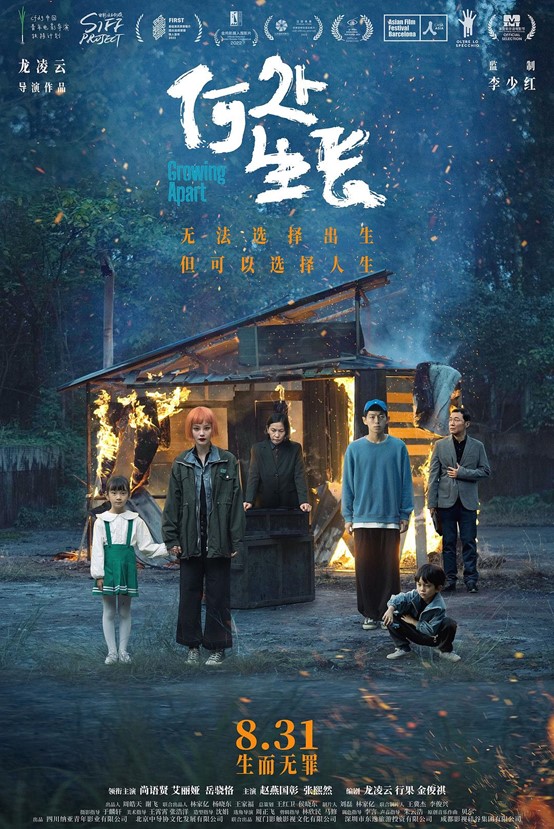
Poster for "Where We Grow"
A Creation Fostered by Comic Books and DVDs: A Decade in Film
Looking back on his childhood, Long Lingyun remembers that his parents were often busy with work, leaving him to carry a set of keys around his neck, attending and returning home alone from school, doing homework by himself. "The feeling of loneliness was deeply ingrained." With no other children to play with at home, he had plenty of free time for reading, including many challenging philosophical books that prompted him to ponder the world and the meaning of life. He remembers enjoying a game he played as a child, quickly closing and opening his eyes. "I always felt that the world might be composed of certain particles, and during the moments my eyes were closed, it could collapse. If I could open my eyes fast enough, I could witness its reconstruction."
After his parents divorced, Long Lingyun had more pocket money to spend. A wealth of comic books became his spiritual sustenance during his teenage years. With growing independence came more decisions he had to make for himself. Looking back, he remembers being accepted into the Sichuan Fine Arts Institute, studying drama in the UK, returning to work in magazines, advertising, and eventually filmmaking, as he reflects on the motivations that led him down the path of creativity: "Perhaps it’s because I felt so lonely as a child.”
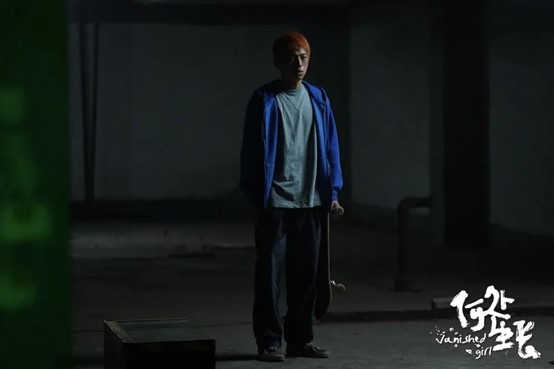
Still from "Where We Grow"
Long Lingyun's dream of making films began in 2014. During his years working in fashion-related jobs, he always harbored a dream of filmmaking. Amid a flourishing era for Chinese cinema, he felt the industry was embracing and expecting young directors, with many non-traditional filmmakers also getting opportunities to produce and screen their works. As a result, he resigned from his job in Shanghai, relocated to Beijing, and enrolled in the literature department of the Beijing Film Academy to study screenwriting.
The initial concept of "Where We Grow" took shape during his study program. Although the first draft differed significantly from the final product, it laid the groundwork for the film's basic structure and themes. In 2015, Long brought the script to the Wu Tianming Film Fund's "Light of Masters" advanced screenwriter workshop, where he met like-minded producer Liu Lei. They began collaboratively adapting the short film into a feature. Under Liu Lei's encouragement, they participated in the first ever project training camp at the Shanghai International Film Festival, where they could submit merely outlines instead of a complete script, which was the first time the project received industry recognition. At the training camp, "I began to understand the complete filmmaking process in earnest.”
In 2019, "The Youth Project" featured "Where We Grow," ultimately reaching the top five. As a youth filmmaker support platform of the Director's Association, projects from "The Youth Project" often receive backing from top industry creators, entering theaters under refined production. "Where We Grow" even garnered interest from major companies in the industry. However, after the New Year in 2020, with the global pandemic radically transforming the film industry and people's lives, Long Lingyun found himself in a period of uncertainty.
As a result of the pandemic, many film projects faced delays or cancellations. By the end of 2020, Long and his team decided to lower the budget and scale down the production, determined to start filming in any case. "I am grateful that the producer urged me to make this wise decision; many art film projects I knew of at that same time ended up pausing.”
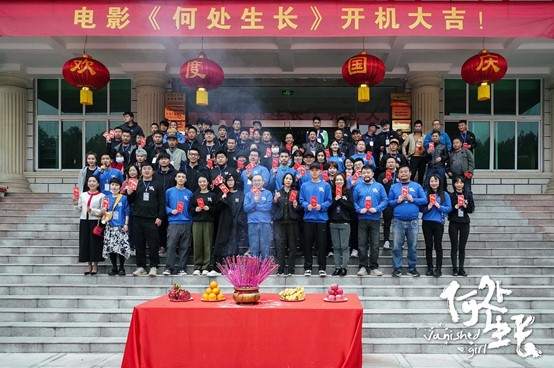
Photo from the shoot of "Where We Grow"
Having studied fine arts from a young age and garnered experience in fashion work, Long Lingyun possesses a natural awareness in the visual presentation of film. This manifests in his careful selection of colors for settings and character wardrobes, reflecting personalities and states, and through wide-angle shots that create an oppressive atmosphere, contrasting the characters' turmoil with handheld shots of the outside world, all stemming from years of artistic training that lead to effortless space construction in narrative.
In the film, the sister who transforms into the "Swallowtail Butterfly," He Sheng, sports a striking orange-red wig, paying homage to classic films like "Run Lola Run" and "The Fifth Element." Directors such as Shunji Iwai, Wong Kar-wai, and Luc Besson were Long Lingyun's cinematic influences during his youth.
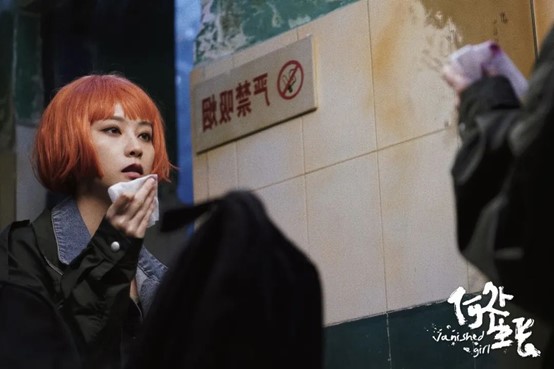
Still from "Where We Grow"
Starting from high school, Long frequented a DVD rental shop near his house, where the owner claimed to have the most comprehensive collection of films within a radius of several kilometers. "I went two or three times a week, renting three to five DVDs each time. Whatever the owner recommended, I watched; my initial taste in films was shaped by him." He remarked jokingly.
The little video store became a utopia for him; in his film, he played a DVD store owner, a way of fulfilling his youthful obsession. The movie overflows with nods to beloved films that reflect the cultural and entertainment atmosphere of the early 21st century, aligning perfectly with the story's temporal setting.
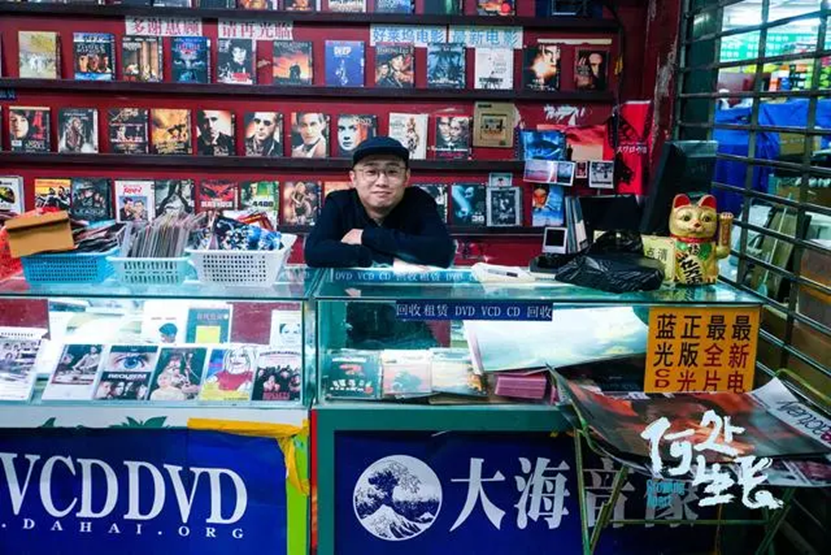
Long Lingyun made a cameo as the DVD store owner in his film.
<

